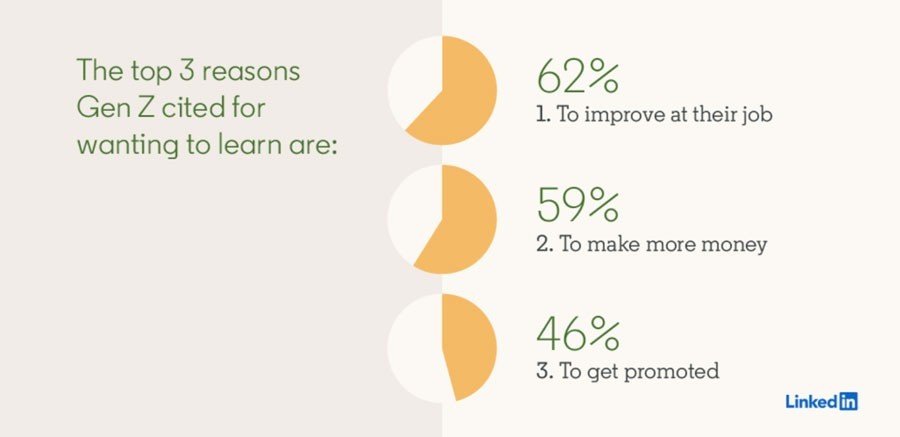Here Is Why Gen Z Believes That Learning Opportunities Are an Important Recruiting Tool
A huge wave of new talent has started to enter offices around the world –– welcome Generation Z, those born between 1995 and 2010. Soon to represent one-fifth of the workforce (a whopping 61 million people), these digital natives are the first cohort of workers that grew up with the Internet, and are used to dynamic and social communication from an early age.
To find out what Gen Z expects as they enter the workforce, we surveyed more than 2,000 of them so we could arm HR and Learning & Development leaders with the insights they need to recruit, engage, and retain this talent.
Here’s what you need to know:
Gen Z knows they’re entering a workforce defined by change
These young workers understand that this is not their parents’ workforce. More than three quarters (76%) of Gen Z professionals feel that the skills necessary today are different from the skills necessary in past generations. While Gen Z realize the importance of soft skills interestingly, nearly two-thirds (62%) of Gen Z believe technical hard skills are changing faster than ever, and are more important in today’s workforce than soft skills.
They’re also prepared for more change, as the majority (59%) don’t feel their job will exist in the same form 20 years from now. Given this, it’s no surprise that nearly 6 in 10 Gen Z professionals are willing to learn new skills.
Learning is a priority –– and a smart recruiting tool
Ninety-three percent of respondents believe learning opportunities are a valuable tool for recruiting Gen Z. This group certainly is driven and hungry to learn –– but it’s not just about getting a raise. Their top reason to learn at work is to improve at their jobs (62%). It’s also worth noting that nearly half of Gen Z respondents prefer a fully self-directed and independent approach, and want to feel they have the time to focus on learning.
As you’re thinking about recruiting and creating opportunities for Gen Z, keep the following in mind:
Emphasize your company’s learning opportunities: Given these new realities, consider how you can redesign entry-level jobs (and training) in a way that can both attract and engage Gen Z. The research found that nearly 40% of Gen Z professionals who are already in the workforce are staying in their current role due to opportunities to learn and grow. Emphasize your company’s learning opportunities not only in the recruiting process, but as part of onboarding and ongoing engagement.
Be authentic: This generation is savvy. They have more resources than any other generation when it comes to researching companies and what it’s like to work there. This is why it’s important to be authentic and consistent in your talent brand and messaging.
Reach them where they are: Again, this generation is digital. They communicate in different ways than their predecessors, meaning that recruiting strategies need to adapt. Whether it’s channels like Snapchat or YouTube, it’s important talent professionals are taking these into consideration.
Give them an opportunity to shine: Again, it’s less about the degree and more about their experience. Spend less time looking at GPA and experience and instead get to know candidates through, say, video resumes and in-person meetings, where hiring teams can connect with the Gen-Zer as a person and see how she’ll fit into their culture.
Create a learning culture: To retain your Gen Z workforce, make the time for them to improve themselves. Given they prefer more self-directed learning, consider whether your programs need a refresh. And don’t forget the importance of nurturing soft skills - our data shows that’s the biggest skills gap today. Gen Z is used to multi-tasking and connectivity, but ensuring they master the top soft skills will be important to future-proofing your workforce.
Stay focused on engagement: Once they’re on board, don’t assume Gen Z will stay engaged. Take the pulse of your workforce with Glint, an invaluable tool to measure employee health and happiness.
And of course, you can discover how LinkedIn Learning can help employees of all generations feel engaged and thrive with our new Learner Engagement Playbook.
Methodology:
LinkedIn conducted a survey of 400 learning and HR professionals at small, medium, and large U.S. companies to understand how they are planning for a successful year of development for all learners; and conducted a survey of more than 2,000 Generation Z, composed of those born between 1995 and 2010, which means that the oldest participants are about 22 and are just entering the workforce.
To receive blog posts like this one straight in your inbox, subscribe to the blog newsletter.
Topics: Data insights Hiring Gen Z
Related articles





